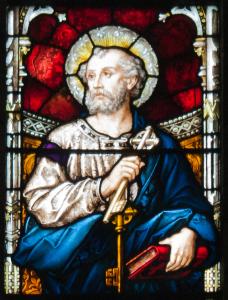(lectionary for April 22, 2018)
 Whenever the collectors of the lectionary send us Hebrew Bible types off to Acts for the weeks leading up to Pentecost, I am always astonished just how many ideas and themes of emerging and contemporary Christianity are to be found in its pages—both for good and ill. Last week I addressed that terrible and horrific overt anti-Judaism that Peter espouses in his sermon of Acts 2 and after his healing of the lame man at the temple in Acts 3. Such language against the Jews led Christians inevitably to the excoriation of Jews and their faith and, in later centuries, to a deplorable anti-Semitism, culminating in the nightmares of the Nazis and their attempts to annihilate Judaism altogether. Luke’s portrayals of Peter have much to answer for in this dark page of Christian history.
Whenever the collectors of the lectionary send us Hebrew Bible types off to Acts for the weeks leading up to Pentecost, I am always astonished just how many ideas and themes of emerging and contemporary Christianity are to be found in its pages—both for good and ill. Last week I addressed that terrible and horrific overt anti-Judaism that Peter espouses in his sermon of Acts 2 and after his healing of the lame man at the temple in Acts 3. Such language against the Jews led Christians inevitably to the excoriation of Jews and their faith and, in later centuries, to a deplorable anti-Semitism, culminating in the nightmares of the Nazis and their attempts to annihilate Judaism altogether. Luke’s portrayals of Peter have much to answer for in this dark page of Christian history.
Today’s text leads us to still another deeply problematic idea that even today leads directly to painful confusion among many Christian believers. Once again, Peter is the culprit. Peter and John have preached to the assembled Jews at the temple that they are killers of Christ, but that if they repent of this monstrous deed, they can join the new Christian community. But since they have earlier been enjoined by many of the religious authorities against preaching about this Jesus character, they are arrested and hailed before “rulers, elders, and scribes” along with “high priest Annas, Caiaphas, John (or Jonathan, as other manuscripts have it), and Alexander”, all members of the high priestly family.
Standing before this large and august body of Jewish leaders, Peter and John are asked quite directly, “By what power or in what name did you do this,” namely the healing of the lame man? Peter replies rather less directly. He says that if their question was asked about a good deed of healing, implying that such a good action is somehow not a worthy one, then the question is by implication foolish and unnecessary. Why do you question a good deed? However, he goes on, if what you really want to know is how was it done, then I will tell you. The lame man is no longer impaired because of the name of Jesus Christ, the Nazorean. He might have stopped there, but Peter can never miss the opportunity to attack the Jews when he has the chance. It was in the name of Jesus, he says, “whom you crucified,” but “whom God raised from the dead.” Then he twists the knife that he has just inserted by adding that one of the Jewish psalms already had predicted what the Jewish leaders would do to the one sent to them as their Messiah. “The stone that was rejected by you, the builders, has become the cornerstone.” In other words, you may have thought that your murder of Jesus ended the matter forever, but in fact Jesus is alive and has become the cornerstone of the emerging structure of the Christian community.
And Peter clinches his attack with the following fateful words: “There is salvation in no one else, for there is no other name under heaven given among mortals by which we must be saved” (Acts 4:12). The awful implications of those words may be readily and nastily summed up: without Jesus no one may be “saved.” I place that operative word in quotation marks, because the word in fact means something rather more like “made whole” or “made unified.” But of course in the history of Christianity, it often came to mean the difference between a delightful heavenly reward and a hot eternity in an unairconditioned Hell. “Are you saved, brother (or sister)” became a demand that one “accept Jesus into your heart” (whatever that peculiar phrase may mean), thereby becoming one of the elect and avoiding a nasty and heated surprise come judgment day.
Available on the service Netflix, and first aired this past Sunday, is the story of one man, a preacher, who lived out the consequences of questioning the usual implications of Peter’s demand in the book of the Acts. Carlton Pearson, pastor of a huge Pentecostal church in Tulsa, OK, with an average weekly attendance of 5000, had a radical change of perspective concerning this basic issue of whether only in the name of Jesus may one be saved from the fires of Hell. He finally determined that that doctrine was incorrect and that God was not in the business of excluding anyone from God’s presence, that all will finally be reconciled with God without exception, regardless of their acceptance or lack of acceptance of Jesus. As a result, his church lost huge numbers of members, and his denomination publically declared that he was a heretic in 2004. Since that time he has become a preacher and pastor in churches connected with the Unitarian community, both in Chicago and in Tulsa. The movie of his life is called “Come Sunday,” and is well worth watching, and could be a wonderful discussion starter for addressing this issue.
I easily admit that I believe as Rev. Pearson now believes; God does not foreclose or exclude anyone from the rule and realm of God, and any who say that God does arrogates to themselves the place of God. It has long struck me as cruel and absurd that God would evaluate the lives of God’s human creatures on the basis of whether or not they have heard and accepted the name of Jesus (?), and surrendered herself to that name. Such a belief, of course, fueled the great 16th and 17th century missionary movements of the Spanish and Portuguese to the Americas, the vast 19th century efforts of the English to India and other lands in the Far East and the Pacific, and the 20th century American missions to Korea and to Latin America and Africa. The enormous size of the Christian world, comprising some two billion souls, is a direct result of these huge and faithful efforts. And yet, I can only conclude that that work was based on a dangerous, however heartfelt, idea that Jesus “must be brought to the heathen.” I reject such an idea completely, and, I think it fair to say, so do most missionaries of the 21st century. The Board of Global Ministries, my United Methodist organization that approves the work of modern missionaries, would utterly reject any candidate who makes the assumption that he or she is going to some other country to “convert the heathen.”
The fact that many of the world’s now seven billion people will live and die without ever hearing the name of Jesus or the gospel that he came to bring, in no way precludes the love that God has for all of them, too, however they have grown to access God, whether as Allah or Shiva or the non-god of some Buddhists, or whether they choose to reach for no god at all. Unless God is the God of all, regardless of whether they know God, that God can only be a limited one, a tribal deity, my God alone. That will plainly not do. Peter simply must be wrong, and the God he represents is too small. John 3:16-17 says it best, however confusingly those famous verses have been employed. “For God so loved the cosmos that God gave God’s only son, so that everyone who believes in him may not die but may have eternal life, because God did not send the son into the cosmos to condemn it, but so that the cosmos might be made whole again through him.” Jesus was sent for all of us, or he was sent for no one. All means all, and hence to limit the possibility of our wholeness to those who hear and accept in only one way is in the end to deny the very reason for God’s gift of Jesus in the first place.
(Images from Wikimedia Commons)











